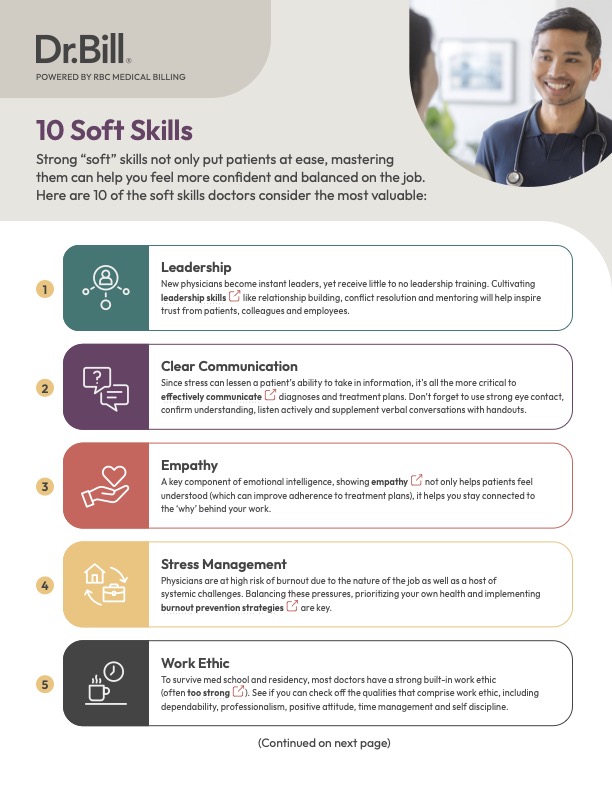Many of the skills required to be a doctor are technical. You need to retain information and be able to apply it at the right time. You need attention to detail, and the ability to keep a level head. Sometimes you’ll need to work long hours, operate under pressure, or jump into an emergency situation. Having these skills is part of being a good physician, but if you’re looking for how to be a more successful doctor, there are other things to keep in mind too:
- Do you know how to make your patients feel comfortable in an awkward situation?
- Do you know how to make them feel safe in a frightening one?
- Do you work well on teams and with other physicians, even when you’re stressed?
Soft skills for doctors are an essential part of the job. Unlike almost every other career, at the core of the medical profession is someone’s well being. The patients you serve aren’t customers looking to pay for a service. They could be hurt, embarrassed, scared, disoriented, or unsure about the future, and their emotional as well as physical well being is up to you.
Soft skills are qualities, habits, and attitudes that make someone a well-rounded professional. While medical schools typically focus on the massive amounts of information you need to study and learn, soft skills for doctors are also part of the job. Having them can help you take better care of your patients, make uncomfortable, painful, or awkward situations easier, and teach you how to be a more successful doctor overall.

10 Soft Skills Every Physician Needs
Soft skills for doctors are an essential part of the job. Unlike almost every other career, at the core of the medical profession is someone’s well being.
Download the checklist to learn the 10 soft skills every physician needs.
Importance Of Soft Skills For Doctors
Patients are people — not clients. They come to you with a wide variety of medical problems, including the embarassing, awkward, and scary, and part of how to be a more successful doctor is not just talking shop. Having pleasant conversations, sharing smiles, or just asking about their day can all be part of building the trust that allows them to feel comfortable in your care – which can mean better patient outcomes overall.
The same is true with the other members of your practice. As the Harvard Business Review suggests, medicine involves leadership. Being a good leader (and having good interpersonal skills) can help you form better relationships with your patients and staff, which can enhance the flow of information in your practice and lead to better outcomes.
At the end of the day, it boils down to people and relationships. It doesn’t matter how skilled or smart you are as a doctor; if you cannot establish a good rapport with the people you work and interact with on a daily basis, patient care is going to be compromised. Patients are much more loyal to a doctor — and likely to tell them the full extent of their issues — when they feel like the doctor will listen and care.
The 10 Soft Skills Doctors Need
Many physicians who enter medical practice are empathetic and care about their patients. However, some may shy away from leadership, have trouble connecting with staff, or come across as cold. The good news is that soft skills can be learned, and if you want to know how to be a more successful doctor, here are 10 to keep in mind:
Leadership
As a doctor, you’ll be leading care teams, a department, or even an entire practice of your own. To ensure everyone is giving their best, it’s important that you’re able to give your team members the support and motivation they need to thrive. This implies taking a more democratic and coaching approach to leadership that encourages discussions and feedback, whether you’re working with nurses or other medical staff, the more you involve your team members, the more they’ll feel like a part of your team.
If you’re not a natural born leader, start by taking ownership of your own role, and doubling down on any strengths you do possess. There are also plenty of options for educational programs as well — leadership programs, such as MBAs or Masters of Public Health are some formal options that can help you to lead.
Clear Communication
Although communication is at the core of all workplaces, it’s an extremely important soft skill for doctors. Physicians need to be able to effectively communicate with patients and their families in both routine situations and ones that may be upsetting. They’ll also need to be able to communicate to people with a wide variety of physical abilities and language needs in a way they can understand.
It’s important for your patient to decipher their diagnosis and the necessary steps for the treatment. The capacity for your patients to follow-through with your medical recommendations depends heavily on how well it’s communicated to them.
Be mindful of your body language. When interacting with others – be it patients or your team members, make eye contact, try not to fidget, look into your phone, or do anything that may make them feel like you’re not giving them your undivided attention.
Empathy
Empathy is a key component of emotional intelligence. It can also help prevent burnout and improve your satisfaction at work. When you understand and are compassionate with how patients are feeling, you can connect with the ‘why’ behind your work.
It’s not only important to feel empathetic towards your colleagues or your patients and their families, it’s equally important to communicate it. Taking the time to listen to people’s concerns and validating their perspective can go a long way in earning their trust and developing a long-term relationship.
Developing this relationship will help your patients trust you, as well as follow your advice and care plans. No matter how busy you are, it’s important to take time and listen to the people around you.
Stress Management
As a doctor, you’re dealing with people’s lives – that’s a lot of pressure! Knowing how to manage stress is important to avoid burnout and focus on good patient care. Some of the most successful doctors know how to not only manage pressure, but thrive on it. However, they are also cognizant of when to hit pause and take a break when things get too stressful. Taking care of your own health is the first step to taking care of others. Here are a few things that you can do:
- Accept that there are things that are not in your control
- Exercise regularly and eat well
- Get enough sleep and seek social support when you need it
- Find ways to manage your time effectively
Work Ethic
Your work ethic is a set of values that you follow no matter what the circumstances. These include punctuality, professionalism, positive attitude, time management, and more. Healthcare is a demanding field. The hours are long and no two days are the same. Therefore, a strong work ethic can go a long way in setting the expectations right and nurturing the future of your team and the care that you provide. Your work ethic also encourages you to find the drive to succeed, without which your career can stagnate.
Humility
As a doctor, you’re often expected to know all the answers. When you don’t, it may feel like you’re not good enough. However, having the self-awareness to admit when you don’t know something or when you’ve made a mistake is a much better approach than moving forward unsure. Not only will this lead to better outcomes but it’ll also help build trust in your patients and your team.
Attention To Detail
While being accurate with details is important in all professions, it’s arguably more important in healthcare, since people’s lives are on the line. Doctors, nurses, and other medical professionals who manage the dose of medications and other measurements have to pay close attention to details for the well-being of their patients. This soft skill becomes a lot more critical in fast-paced situations such as in the emergency room, where constant activities and distractions can make it difficult to focus on the task at hand.
Confidence In Your Skills
As a physician, it’s important that you feel confident in your skills and then project that confidence in your work. This makes it easier for the patients to trust you and follow-through your prescribed treatment plan. When you operate from a place of confidence, you transfer that feeling into your team, and a confident team performs at its best capabilities — delivering top-notch patient care.
Learning from Feedback
No matter how good you were in medical school and in your medical residency, you won’t have the answer to every single question. Sometimes there are things you don’t know, and mistakes can happen! Learning from every situation is critical. Healthcare is constantly evolving and even physicians at the top of their game may have gaps in their knowledge due to advances in technology, medicine, and administrative procedures. Be open, receptive, and willing to learn.
Positive Outlook
People, in general, benefit from looking at things in a more positive way. However, in healthcare, where you’re dealing with illness and diseases, this soft skill for doctors comes in handy. The stress of the job, the teamwork, and the frequent meetings with patients can make it difficult for you to keep a sunny outlook all the time. Often, the harsh realities of healthcare can wear down even the strongest physicians. Show appreciation to your team, communicate your needs with others, and try to see the best in the people and situations as they come.
Conclusion
Although some skills may come more naturally to you than others, an important part of being a physician is continuing to learn. Find resources and situations to practice and enhance these soft skills. Like hard skills, soft skills can also be improved with practice — the same determination that earned you a place in medical school and got you to graduation can help you to learn how to be a more successful doctor overall. Never stop learning!







